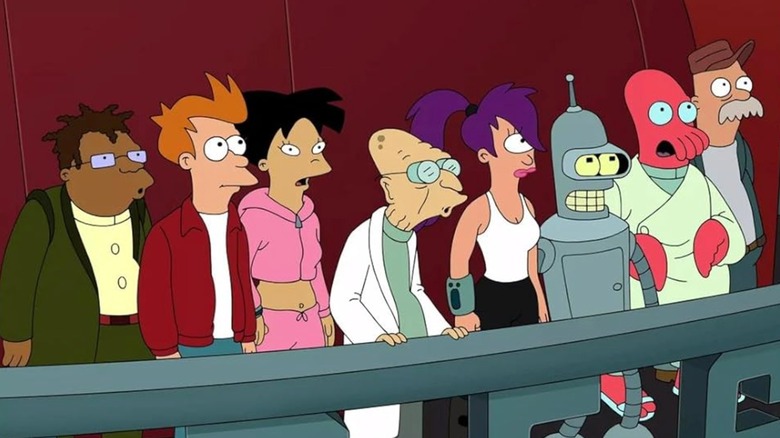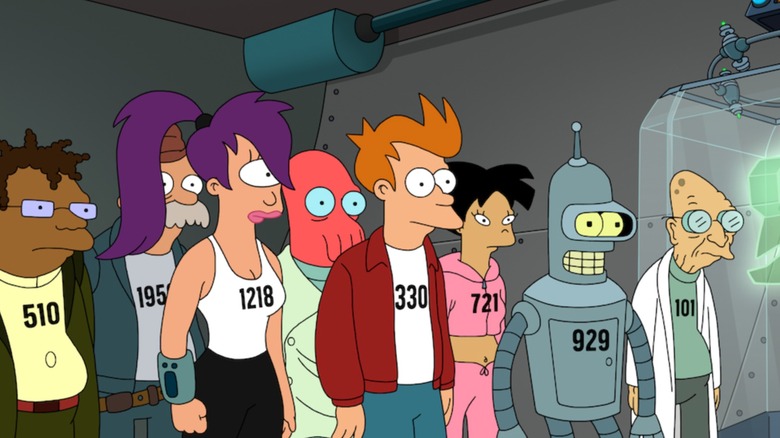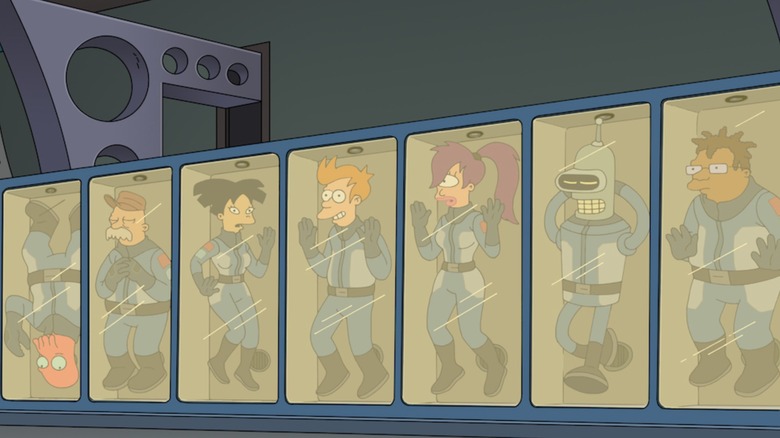Futurama Season 13's Best Episode Echoes Classic Star Trek And Other Sci-Fi Stories
Spoilers for "Futurama" season 13 follow.
"Futurama" has always had a satirical streak. The series is a comedy, and the biggest joke is that 1000 years later, life isn't that different from today. Since the series was revived at Hulu, though, most episodes have felt hyper-topical. "Futurama" has been parodying trends or events that sometimes already felt dated when the episodes premiered.
Seasons 11 to 12 "Futurama" featured episodes about Amazon, streaming TV, the Covid-19 pandemic, cancel culture, cryptocurrency, NFTs, and chatbots. The newly premiered season 13 keeps the cultural satire going.
"The World is Hot Enough" is about global warming and our ongoing inaction preventing it. (If you want to get super depressed about how little this problem has been addressed, "Futurama" already did a climate change episode in 2002, "Crimes of the Hot" guest-starring Al Gore.) "Scared Screenless" is about those damn kids and their screen addictions. "Murderoni" parodies the Pizzagate conspiracy theory, which might've been biting back in 2016 but is past its expiration date now.
Not every episode was like this, granted. Season 13 was the most balanced of the Hulu "Futurama" seasons yet, relying on character-based episodes as much as current event lampooning; perhaps the show has requisitioned its groove back.
The season finale, "The White Hole," was an especially strong episode. It probably helped that it was written by Patric Verrone, who has been with "Futurama" since season 1, all the way back in 1999. "The White Hole" is titled after the phenomena that opens up in the sky light years away from Earth. White holes are hypothesized by real scientists and are the opposite of black holes; while black holes suck everything into an inescapable void, white holes cannot be entered by matter, energy, or light. In "The White Hole," the hole is the site of a new universe being born; the Planet Express crew chart a mission to observe the hole and the nascent universe inside.
Many "Futurama" writers are as passionate about STEM as they are about comedy and cartoons; co-creator David X. Cohen is educated in physics and computer science, writer Ken Keeler has a Ph.D. in mathematics which he used to write a real mathematical theorem for the body swap episode "The Prisoner of Benda," etc.
Often, the science-fiction of "Futurama" would have a kernel of reality to it. Less "South Park" and more "Star Trek," "The White Hole" sees Planet Express boldly going where no-one has gone before.
In The White Hole, Planet Express takes a trip to a new universe
The white hole expedition has a complication; the hole is emitting chronitons, or particles that speed up the flow of time. Get too close to it and millions of years will pass for you while only minutes pass outside of the white hole's range. Sci-fi fans might be thinking of "Interstellar," which similarly played around with the flow of time across space travel.
"The White Hole" is actually building on a previous "Futurama" episode from the original Fox run: "Time Keeps on Slippin'" where chronitons (a concept nicked from "Star Trek") cause time to randomly jump ahead across the universe. Like that episode, this one also features Harlem Globetrotter/super-scientist Bubblegum Tate (Phil LaMarr). "The White Hole" builds on "Time Keeps on Slippin'" without being an inferior sequel to or lazy retread of it.
To get around the chronitons, the Planet Express crew enters cryogenic hibernation. Astronauts freezing themselves to reach the future is right out of the original "Planet of the Apes."
During this trip, the Planet Express ship is stocked with a 3D printer-like device that can create clones of the crew to fulfill certain tasks or maintenance — and only those tasks, because they age and crumble into dust within two minutes. The second half of "The White Hole" follows these clones tending to the ship across millions of years.
Futurama season 13 tackles the ethics (and comedy) of cloning
The clones are disposable and brought into being with all their original selves' memories and emotions, only to barely live before they die. "Futurama" understands the existential horror but, knowing the kind of show it is, uses it for cruel jokes rather than existential pondering.
The cloning subplot resembles the sci-fi films "Moon," where a moon miner Sam Bell (Sam Rockwell) learns he is only the latest Sam cloned by his corporate employer, or "Mickey 17." In the latter, Mickey (Robert Pattinson) wants to escape Earth and his debts, so he volunteers to be an "Expendable" starship crew member; his job is to handle fatal tasks, die, get cloned back to life, repeat.
Yet while the concept might ring familiar to sci-fi fans, the execution feels unique to "Futurama." It's not parodying those movies, just telling a similar story with its own sense of humor. Speaking of that humor, the episode manages a great (if low hanging) political joke. Early in the episode, Professor Farnsworth (Billy West) says they have to convince President Richard Nixon's head (West) to send them on the mission "in a language he'll understand." Smash cut to the Professor dropping a sack full of money on Nixon's Resolute Desk.
There's 100% a place for topical humor in "Futurama," but the show is best when it remembers to be a sci-fi show, too. Here's hoping season 14 doesn't again save its very best and most fantastical episode for last.
"Futurama" is streaming on Hulu, including all episodes of season 13.


